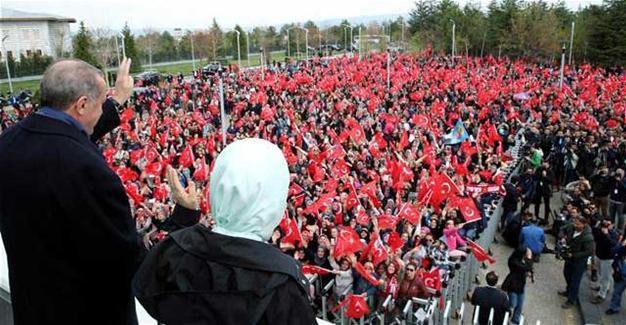President Erdoğan’s death penalty remarks start debate with Europe
ISTANBUL / PARIS

President Recep Tayyip Erdoğan’s remarks over reinstating capital punishment following the approval of constitutional amendments in the April 16 referendum has triggered a fresh debate, collecting warnings from European allies.
Erdoğan said during his arrival to Ankara from Istanbul on April 17 that he would approve the return of the death penalty if the parliament passes such a law to pay respect “to our martyrs.”
“If [a bill] comes before me, I will approve it. But if there isn’t support [from opposition MPs], then we could have another referendum for that,” Erdoğan said late on April 16 to a crowd in Istanbul, which chanted for its reintroduction.
A referendum on restoring the death penalty in Turkey would constitute a break from European values, the French president’s office warned on April 17.
France said the organization of a referendum on the death penalty would “obviously be a break with values and engagements” that was accepted by Turkey when it first joined Europe’s top rights watchdog, the Council of Europe, the presidency said.
The French presidency said it “took note” of the figures and the “disputes” surrounding them, saying they showed “that Turkish society is divided over the proposed deep reforms.”
In a separate statement, France’s foreign ministry called on the Turkish government to respect the European Convention on Human Rights and its ban on the death penalty.
Although the death penalty had not been in effect since 1984, Turkey abolished the capital punishment in 2004 as a part of reforms to ease Turkey’s accession into the European Union.
European Commission chief Jean-Claude Juncker said in March that any return of the death penalty in Turkey would be a “red line” in the country’s stalled EU membership bid.
German Chancellor Angela Merkel and Foreign Minister Sigmar Gabriel, meanwhile, said on April 17 that Turkish authorities needed to address concerns about the content and procedure of the referendum raised by a panel of European legal experts.
“The German government respects the right of Turkish citizens to decide on their own constitutional order,” they said in a statement.
“The tight referendum result shows how deeply divided the Turkish society is and that means a big responsibility for the Turkish leadership and for President Erdoğan personally,” the statement said.
The European Commission said Turkey should seek a broad national consensus on constitutional amendments. In March, the Venice Commission, a panel of legal experts at the Council of Europe, said the proposed changes to the constitution on which Turks voted, namely boosting Erdoğan’s power, represented a “dangerous step backwards” for democracy.
Austria, which has repeatedly called for halting membership talks, once more called for them to stop.
“We can’t just go back to the daily routine after the Turkey referendum. We finally need some honesty in the relationship between the EU and Turkey,” said Foreign Minister Sebastian Kurz, adding the bloc should instead work on a “partnership agreement.”
Kremlin spokesman Dmitry Peskov told reporters on April 17 that the results of the Turkish referendum should be respected. He said the vote was a domestic Turkish matter.
Rached Ghannouch, the leader of Tunisia’s Ennahdha Party, said he called Erdoğan to congratulate him over the win.
Both Hamas and the Palestinian Liberation Army congratulated Erdoğan, according to state-run Anadolu Agency.
 President Recep Tayyip Erdoğan’s remarks over reinstating capital punishment following the approval of constitutional amendments in the April 16 referendum has triggered a fresh debate, collecting warnings from European allies.
President Recep Tayyip Erdoğan’s remarks over reinstating capital punishment following the approval of constitutional amendments in the April 16 referendum has triggered a fresh debate, collecting warnings from European allies.